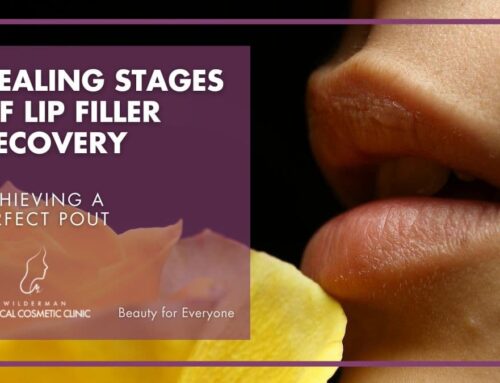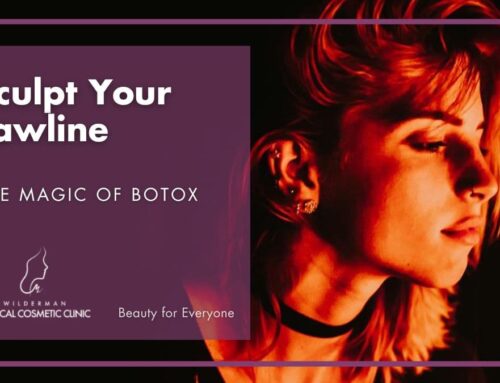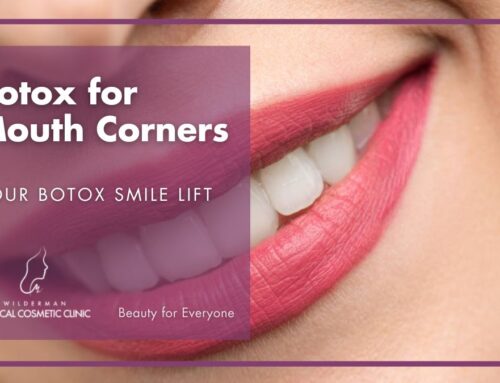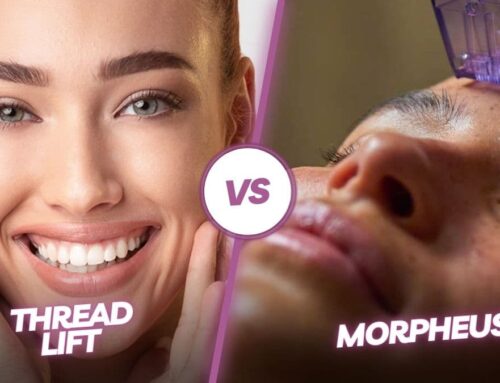What Makes Wrinkles Worse
Do’s, and Don’ts of Wrinkle Prevention
Wrinkles, those fine lines that gradually appear on our skin as we age, are a natural part of life.
While we can’t completely stop the clock, there are steps we can take to slow down the development of wrinkles and maintain our youthful-looking and radiant skin for as long as possible.
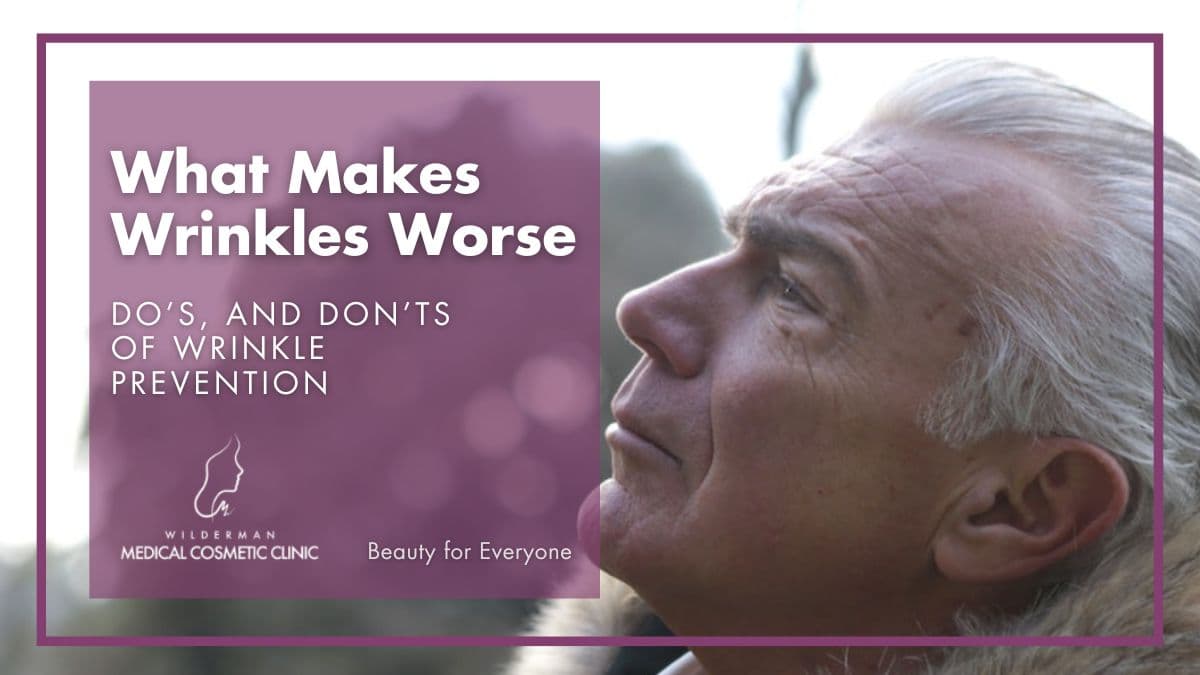
Get immediate answers to your questions about treatment options, costs, expected outcomes, and more.
- Expert Diagnosis
- Customized Treatment Plans
- No Obligation
- Comfort and Privacy
- Immediate Answers
In this blog post, we’ll delve into the science of why wrinkles develop, explore the do’s of wrinkle prevention, and highlight the don’ts that can accelerate the aging of our skin.
Why Do Wrinkles Develop?
Wrinkles develop primarily due to a combination of intrinsic and extrinsic factors, and their formation is a natural part of the aging process. Let’s delve deeper into why wrinkles develop:
- Aging:
- Loss of Collagen and Elastin: Collagen and elastin are two crucial proteins in our skin. Collagen provides structural support and firmness, while elastin imparts elasticity. As we age, the production of collagen and elastin decreases. This results in the skin losing its ability to bounce back, leading to sagging and the formation of wrinkles.
- Reduced Hyaluronic Acid: Hyaluronic acid is a molecule that helps our skin retain moisture and stay hydrated. With age, the production of hyaluronic acid decreases, causing the skin to become drier and more prone to wrinkles.
- Skin Thinning: Skin cell turnover, the process by which old skin cells are replaced with new ones, slows down as we age. Over time, the skin becomes thinner and more fragile, making it more susceptible to developing wrinkles.
- Exposure to UV Radiation:
- Sun Damage: One of the primary external factors contributing to wrinkles is exposure to ultraviolet (UV) radiation from the sun. UV rays penetrate the skin and damage collagen and elastin fibers. This leads to the breakdown of these essential proteins, causing the skin to lose its structure and elasticity.
- Photoaging: Cumulative sun exposure over the years leads to a phenomenon known as photoaging. This results in premature aging signs, including wrinkles, fine lines, age spots, and a leathery texture.
- Smoking: Smoking introduces harmful chemicals into the body, which generate free radicals. These highly reactive molecules damage skin cells and break down collagen and elastin fibers. Smoking also narrows blood vessels, reducing the flow of oxygen and nutrients to the skin, further accelerating the aging process.
- Environmental Factors:
- Pollution: Exposure to air pollution, including fine particulate matter and environmental toxins, can accelerate wrinkle development. Pollution can lead to oxidative stress, inflammation, and collagen degradation.
- Climate: Living in harsh climates with extreme temperature fluctuations, high humidity, or low humidity can affect your skin. Dry and cold climates can lead to moisture loss, potentially worsening skin issues and wrinkles.
- Repetitive Facial Expressions: Some wrinkles, known as dynamic wrinkles, are caused by the repetitive use of facial muscles over time. For instance, smiling, frowning, or squinting can lead to the formation of crow’s feet and frown lines. These wrinkles tend to become more noticeable as we age.
- Genetics: Some people are genetically predisposed to maintain more youthful-looking skin for longer periods, while others may be more prone to premature aging. Factors such as the natural thickness of your skin, the strength of collagen and elastin production, and inherited skin conditions can all be influenced by your genes.
- Poor Skincare Habits: Neglecting proper skin care can contribute to skin damage and wrinkle development. Failing to moisturize, using harsh skincare products, and not removing makeup properly can all affect the skin’s health and accelerate the aging process.
The Do’s of Wrinkle Prevention
To effectively prevent wrinkles and maintain youthful-looking skin, it’s important to follow a set of recommended practices. Here are the key “do’s” of wrinkle prevention:
- Sun Protection: Protecting your skin from the sun’s harmful UV rays is one of the most crucial steps in wrinkle prevention. Here’s what you should do:
- Wear Sunscreen: Apply a broad-spectrum sunscreen with SPF 30 or higher to all exposed skin, including your face, neck, and hands, even on cloudy days.
- Reapply Sunscreen: Reapply sunscreen every two hours when you’re outdoors, and more frequently if you’re swimming or sweating.
- Seek Shade: Whenever possible, stay in the shade, especially during peak sun hours (10 a.m. to 4 p.m.).
- Wear Protective Clothing: Consider wearing long-sleeved shirts, wide-brimmed hats, and sunglasses to shield your skin from direct sunlight.
- Healthy Diet: Your diet plays a significant role in the health of your skin. Try to add the following to your diet:
- Antioxidant-Rich Foods: Consume a diet rich in fruits and vegetables, as they are packed with antioxidants that combat free radicals, which contribute to skin aging.
- Omega-3 Fatty Acids: Include foods like fatty fish (salmon, mackerel, and sardines) and flaxseeds in your diet to support skin health.
- Hydration: Properly hydrating your skin is essential to prevent the development of wrinkles. Follow these hydration tips:
- Stay Hydrated: Drink plenty of water throughout the day to maintain skin hydration and overall health.
- Use a Moisturizer: Apply a moisturizer suitable for your skin type daily to lock in moisture.
- Humidifier: In dry climates or during the winter months, consider using a humidifier to add moisture to the air in your home.
- Regular Skincare Routine: Establish a consistent skincare routine to maintain skin health and reduce the appearance of wrinkles. Here’s what you should do:
- Cleansing: Cleanse your face daily with a gentle cleanser to remove dirt, oil, and makeup.
- Exfoliation: Exfoliate your skin regularly to remove dead skin cells, promoting a smoother complexion.
- Use Anti-Aging Products: Incorporate products containing ingredients like retinol, hyaluronic acid, and antioxidants to target fine lines and wrinkles.
- Adequate Sleep: Ensure you get enough quality sleep each night. Sleep is when your body repairs and regenerates, including your skin.
The Don’ts of Wrinkle Prevention
To effectively prevent wrinkles and maintain youthful skin, it’s equally important to avoid certain habits and practices that can contribute to premature aging. Here are the key “don’ts” of wrinkle prevention:
- Don’t Skip Sunscreen: Never go outside without applying sunscreen. Avoid tanning beds and limit sun exposure during peak hours (10 a.m. to 4 p.m.).
- Don’t Overindulge in Alcohol: Excessive alcohol consumption can dehydrate your skin and lead to premature aging.
- Don’t Use Harsh Skincare Products: Using harsh or abrasive skincare products can strip your skin of its natural oils and disrupt its moisture balance.
- Don’t Over-Exfoliate: Excessive exfoliation can irritate your skin and make it more vulnerable to damage. Stick to a moderate exfoliation routine, typically once or twice a week.
- Don’t Rub or Pull Your Skin: Be gentle when applying skincare products or removing makeup to prevent stretching and damaging delicate skin. Use gentle, upward motions when applying creams or lotions. Pat or dab rather than rubbing.
- Don’t Ignore Eye Care: The delicate skin around the eyes is especially prone to wrinkles. Use a gentle eye cream to keep this area moisturized and protected.
- Don’t Over Wash Your Face: Excessive washing can strip your skin of its natural oils, leading to dryness and potentially accelerating the development of wrinkles
- Don’t Sleep on Your Stomach or Side: Sleeping with your face pressed against a pillow can lead to sleep lines and creases on your skin. Try to sleep on your back to minimize the risk of these sleep-related wrinkles.
- Don’t Neglect Stress Management: Practice stress-reduction techniques such as meditation, yoga, or deep breathing exercises, as stress can accelerate the aging process.
Takeaway
While wrinkles are a natural part of the aging process, there are steps you can take to slow down their development and maintain youthful, healthy-looking skin.
By understanding the science behind wrinkles and following the dos and don’ts of wrinkle prevention, you can take control of your skin’s aging process and embrace a more youthful appearance for years to come.
Consistency in your skincare routine and healthy lifestyle choices are key to preserving your skin’s natural beauty. Remember, sunscreen is your best friend when it comes to wrinkle prevention.
Reference
Wexner Medical Center. (Jun 26, 2020). Stop Doing These 6 Things That Cause Wrinkles. Retrieved from https://wexnermedical.osu.edu/blog/stop-doing-these-6-things-that-cause-wrinkles (Accessed Sep 21, 2023).
Medical Cosmetic Clinic. (Jun 12, 2023). Wrinkles and Fine Lines. Retrieved from https://www.medicalcosmeticclinic.ca/skin-conditions/wrinkles-and-fine-lines/ (Accessed Sep 21, 2023).
Your Laser Skin Care. (Jun 5, 2020). The Things We Do That Make Our Wrinkles Worse. Retrieved from https://www.yourlaserskincare.com/blog/the-things-we-do-that-make-our-wrinkles-worse (Accessed Sep 21, 2023).
Good Housekeeping. (May 28, 2015). 10 Wrinkle-Causing Habits You Had No Idea You Were Doing. Retrieved from https://www.goodhousekeeping.com/beauty/anti-aging/a32732/wrinkle-causes-bad-habits/ (Accessed Sep 21, 2023).
Related content that may be of interest
Deep Wrinkles: Treatments and Prevention – Wrinkles can be classified into two types: dynamic wrinkles and static wrinkles. Dynamic wrinkles are temporary lines and creases that appear during facial movements or expressions.
Wrinkles and Fine Lines: Common skin concerns – Wrinkles and fine lines are common skin concerns that can affect individuals as they age. While the terms are often used interchangeably, there are differences between fine lines and wrinkles, both in terms of appearance and treatment options.
Microneedling for Wrinkles: A Revolutionary Approach to Rejuvenating Your Skin – Microneedling is a cosmetic procedure that has garnered attention for its effectiveness in treating wrinkles and promoting skin rejuvenation. Microneedling involves the use of a specialized …
Join us on the journey to your best skin ever!
Beyond Beauty: Elevate Your Routine with Insider Tips and Breakthroughs – Subscribe Now!
Transform your beauty routine into something extraordinary!


